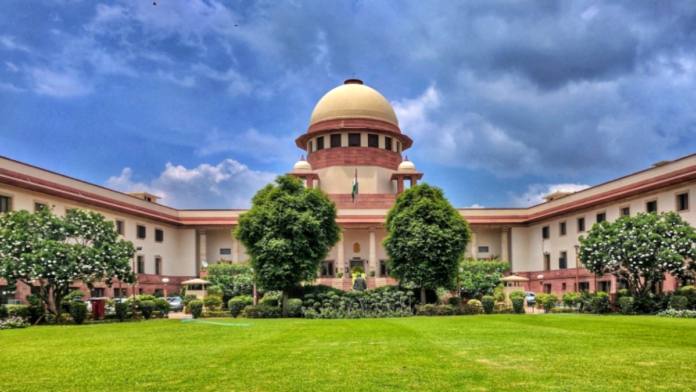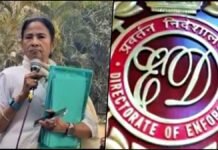
Key Points
- Supreme Court has stayed ED’s money laundering investigation against Tamil Nadu’s state-run liquor corporation TASMAC.
- Chief Justice BR Gavai criticized ED for “crossing all limits” and violating the federal structure of the Constitution.
- The case involves alleged Rs 1,000 crore scam in liquor pricing, tender manipulation, and bribery at TASMAC.
- Tamil Nadu government argued that ED seized and cloned phones of TASMAC officials, violating their privacy.
- The Supreme Court’s order overturns Madras High Court’s April 23 ruling that had allowed ED to continue its probe.
New Delhi: In a significant rebuke to central investigative agencies, the Supreme Court on Thursday stayed the Enforcement Directorate’s probe against Tamil Nadu State Marketing Corporation (TASMAC), with Chief Justice of India BR Gavai sharply criticizing the agency for “crossing all limits” and violating the federal structure of the Constitution.
“ED Violating Federal Structure”: CJI’s Strong Remarks
During the hearing of petitions filed by the Tamil Nadu government and TASMAC challenging ED raids, CJI Gavai made scathing observations about the agency’s conduct. “How can there be a criminal case against a corporation? You may register cases against individuals… but corporations? Your ED is crossing all limits,” the CJI remarked.
The bench, also comprising Justice Augustine George Masih, went further to state that the ED was “totally violating the federal structure of the Constitution” through its actions against the state-run corporation. These strong comments came after Senior Advocate Kapil Sibal, representing Tamil Nadu, argued that the ED had seized and cloned mobile phones of TASMAC officials during raids conducted in March and May 2025.
Case Background: Rs 1,000 Crore Alleged Scam
The controversy stems from ED raids conducted at TASMAC headquarters in Chennai between March 6-8, 2025, and subsequent searches on May 16. The central agency alleged it had uncovered evidence of large-scale irregularities involving approximately Rs 1,000 crore through fraudulent transactions.
According to ED, distillery companies had siphoned off unaccounted cash, which was allegedly used as kickbacks to secure contracts and obtain more supply orders from TASMAC. The agency also claimed to have found evidence of irregularities in staff transfers, bar tender allocations, and transport tender manipulations.
Tamil Nadu’s Arguments Against ED Action
Senior Advocates Kapil Sibal and Mukul Rohatgi, appearing for the Tamil Nadu government, informed the court that the state’s own Directorate of Vigilance and Anti-Corruption (DVAC) had already filed 41 FIRs between 2014 and 2021 related to alleged corruption at TASMAC outlets.
Rohatgi specifically highlighted privacy concerns, arguing that ED had seized and cloned phones of TASMAC officials in violation of their fundamental rights. Sibal added that the state itself had been investigating corruption cases where “some of the people to whom outlets have been given are actually taking cash,” but ED’s targeting of the corporation itself was inappropriate.
Supreme Court’s Order
After hearing arguments from both sides, the Supreme Court issued notice to the ED, returnable after the court’s summer vacation, and ordered a stay on the agency’s actions until further orders.
“Issue notice, returnable after vacation. Meanwhile, stay granted of further proceeding,” CJI Gavai stated[1]. The court also directed the ED to file an affidavit explaining what the predicate offence was in the case.
Madras High Court’s Earlier Ruling Overturned
The Supreme Court’s order effectively overturns the Madras High Court’s April 23 judgment, which had dismissed petitions filed by the Tamil Nadu government and TASMAC challenging the ED raids. The High Court had then ruled that the allegations against TASMAC were grave and warranted deeper investigation under the Prevention of Money Laundering Act (PMLA).
The High Court had also rejected arguments that the raids were politically motivated, stating that “courts are not the place to decide political matters” and that the judiciary’s role was to examine evidence and apply the law, irrespective of political context.
Political Reactions
The Supreme Court’s order has been welcomed by the ruling DMK in Tamil Nadu. Former Rajya Sabha MP RS Bharathi told reporters that the order was a “blow to the BJP’s efforts to malign the state government” and had “put an end to the atrocities committed by the ED”.
The case highlights growing tensions between central investigative agencies and state governments, with the Supreme Court’s intervention raising important questions about federalism and the limits of central agencies’ powers when investigating state-run entities.















































